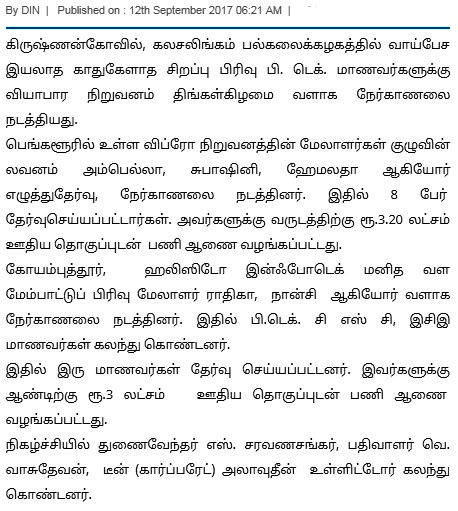12.09.2017
நாகை மாவட்டம் சீர்காழியில் இருக்கிறது அந்த பஞ்சர் கடை. இதன் உரிமையாளரான 28 வயது இளைஞர் பாக்கியராஜ் பம்பரமாய் சுழன்று கொண்டிருக்கிறார். சீர்காழி - மயிலாடுதுறை நெடுஞ்சாலையில் பரபரப்பான தென்பாதியில் இருப்பதால் பாக்கியராஜின் பஞ்சர் கடையும் எந்நேரமும் பரபரப்பாய் இயங்குகிறது.
காற்றுப் பிடிக்க, பஞ்சர் போட என வாடிக்கையாளர்கள் வந்த வண்ணமிருக்கிறார்கள். அத்தனை பேருக்கும் அவகாசம் போட்டு வேலையை முடித்துக் கொடுக்கும் பாக்கியராஜ், காது கேளாத, வாய் பேசாத மாற்றுத் திறனாளி. இருந்தாலும், அதை வெளிக் காட்டிக் கொள்ளாமல் சராசரி மனிதர்களைப் போல இயங்குகிறார். கடையில் இவருக்கு உதவியாக இருக்கும் மணிகண்டனும் இவரைப்போல காது கேளாத, வாய் பேசாத மாற்றுத்திறனாளி தான்.
களம் அமைத்த பாக்கியராஜ்பேசமுடிந்தவர்கள் யாரிடமும் எதைவேண்டுமானாலும் பேசிவிடலாம். எதையும் எளிதில் பகிர்ந்து கொண்டுவிடலாம். ஆனால், வாய் பேசமுடியாத வர்கள் தங்களது எண்ணங்களையும் உணர்வுகளையும் யாரிடம் எப்படிப் பகிர்ந்துகொள்வார்கள்? இந்தக் கவலையைப் போக்க தனது பஞ்சர் கடையிலேயே களம் அமைத்திருக்கிறார் பாக்கியராஜ்.
வாய்பேச முடியாத, காது கேளாத மாற்றுத்திறனாளிகள் பத்துப் பேர் தினமும் மாலைநேரத்தில் இந்தப் பஞ்சர் கடைக்கு வந்துவிடுகிறார்கள். இவர்கள் அனைவருமே 25 வயதுக்குட்பட்ட இளைஞர்கள். டெய்லர் மகேஷ் மயிலாடுதுறையிலிருந்து தினமும் இங்கு வந்துவிடுகிறார். பி.ஏ., பட்டதாரியான முகேஷ், 12-ம் வகுப்புப் படித்துவிட்டு கொத்தனார் வேலை பார்க்கும் தீபக்குமார், வைத்தீஸ்வரன்கோயிலைச் சேர்ந்த டூவீலர் மெக்கானிக் விக்னேஷ், பரோட்டா மாஸ்டர் ஜெயிலானி, டிரைவர் சிவகுமார் இப்படிப் பலரும் கூடிவிட, மாலை நேரத்தில் பாக்கியராஜின் பஞ்சர் கடையில் ஜமா களைகட்டுகிறது.
இங்கு, ஒரே அலைவரிசை கொண்ட இந்த நண்பர்கள் கூடி அரட்டையடிக்கும் காட்சியை காணக் கண்கோடி வேண்டும். ஒவ்வொருவராக உள்ளே நுழையும்போது அவர்களுக்கான மவுன மொழியில் வரவேற்பதாகட்டும்.. அணிந்திருக்கும் உடைகள் மீதான விமர்சனங்களாகட்டும்.. அனைத்தும் வாய்மொழிகளைவிட வலியதாகவே இருக்கிறது. அரசியல், காதல், கசமுசா, நீட்தேர்வு, வேலையில்லாத் திண்டாட்டம், அனிதா தற்கொலை, விவசாயிகள் போராட்டம் என அத்தனை விஷயங்களையும் இவர்கள் அப்டேட்டுடன் அற்புதமாய் விவாதிக்கிறார்கள்.
இதில், முகேஷ், மகேஷ், பாக்கியராஜ் இவர்கள் மூவரும் திருமணமானவர்கள். பாக்கியராஜின் மனைவி சுகந்தியும் வாய் பேசமுடியாத மாற்றுத்திறனாளிதான். இவர்களின் திருமணத்தை நடத்தி வைத்ததே இந்த மாலை நேரக் கச்சேரி குழுதானாம்! இவரைப் போலவே மகேஷும் வாய்பேச முடியாத மாற்றுத்திறனாளிப் பெண் ஒருவரைத்தான் மணந்திருக்கிறார்.
திருமணமான மூவரும் மற்றவர்களின் காதல் குறித்து கலாய்ப்பதும் பதிலுக்கு அவர்கள் இவர்களை ரகளை கட்டுவதும் அங்கே நடக்கும் மவுன பாஷையின் நவரசங்கள். ஒட்டுமொத்தக் குழுவும் இலக்கு வைத்துத் ‘தாக்கும்’ நபராய் இருக்கிறார் முகேஷ். அவரை கண்டபடி கலாய்க்கிறது கூட்டம்; அத்தனைக்கும் சளைக்காமல் பதிலடி கொடுக்கிறார் கில்லாடியான முகேஷ்!
இரண்டு பெரியவர்களும்..இவர்களின் இந்த மாலை நேர கொண்டாட்டத்தில், தலைநரைத்த இரண்டு பெரியவர்களையும் பார்க்க முடிகிறது. காது கேளாத மாற்றுத்திறனாளியான டெய்லர் பன்னீர்செல்வமும், கடலைக்கடையில் வேலை பார்த்து ஓய்வுபெற்ற கலியமூர்த்தியும்தான் அந்த சிறப்பு விருந்தினர்கள்! இந்த மாற்றுத்திறனாளி இளைஞர்களின் கேலி, கிண்டல்களை ரசிக்கும் இவர்கள், தங்களது எண்ணங்களையும் இவர்களோடு பகிர்ந்துகொண்டு, கொஞ்சநேரம் மட்டும் இங்கே இளைஞர்களாய் இருந்துவிட்டுப் போகிறார்கள்.
இந்தக் குழுவை ஆதரித்து, அன்புகாட்ட பஞ்சர் கடை இருக்கும் இடத்தின் உரிமையாளர் கணேசன் இருக்கிறார். இவரும் இங்கு அவ்வப்போது ஆஜராகி விடுகிறார். இவர்தான் பாக்கியராஜுக்கு வாடகைக்கு கடை கொடுத்து தொழில் தொடங்கச் சொன்னவர். இப்போது பாக்கியராஜுக்கும் அவரது நண்பர்களுக்கும், மற்றவர்களுக்கும் இவர்தான் உறவுப் பாலம்! இந்த இளைஞர்களுக்குள் ஏற்படும் சிறு சச்சரவுகள், இவர்களுக்கான பணத் தேவைகள் அத்தனையும் கணேசனால் தீர்த்து வைக்கப்படுகிறது.
எங்களுக்கான மனமகிழ் மன்றம்அடிக்கடி உட்கார்ந்து கதை கேட்பதால் கணேசனுக்கும் இவர்களின் மவுன பாஷை அத்துபடியாகி விட்டது. நம்மைப் பற்றி அந்த இளைஞர்களிடம் கணேசன் சொல்ல.. நம்மோடும் மவுனத்தால் பேசினார்கள் அந்த இளைஞர்கள். அதை நமக்கு மொழியாக்கம் செய்தார் கணேசன். “வீட்டில் எவ்வளவு நேரம்தான் வெறுமனே உட்கார்ந்திருப்பது? பணியிடங்களிலும் மற்றவர்கள் சொல்வதை எங்களால் கேட்கமுடியாது, அவர்களுடன் உரை யாடவும் முடியாது. இந்த நிலையில், தான் எங்களுக்கான மனமகிழ் மன்றமாக பாக்கியராஜின் கடையை பயன்படுத்துகிறோம். எங்களது சுக - துக்கங்கள் அனைத்தையும் இங்கே எங்கள் பாஷையில் தயக்கிமின்றி பகிர்ந்து கொள்கிறோம். உள்ளூர் நிலவரம் தொடங்கி உலக அரசியல் வரை பேசுகிறோம்.
ஒவ்வொருவரும் வெவ்வேறு இடத்திலிருந்து வந்தாலும் ஒருமித்த எண்ணமும், சம வயதும் எங்களுக்கே உரித்தான இந்த மவுன பாஷையும் எங்களை ஒன்றாகச் சேர்த்துவிட்டது. இங்கே கூடவேண்டும்.. அங்கே போக வேண்டும்.. என்பதான எங்களுக்கான சந்திப்புகளை எஸ்.எம்.எஸ். மூலமாக உறுதிப்படுத்திக் கொள்கிறோம்.
மொத்தத்தில், வாய் பேசமுடியவில்லையே என்ற மன அழுத்தம் இல்லாமல் நாங்கள் இயல்பாய் இருக்கிறோம்” என்று கணேசன் மொழி யாக்கம் செய்து முடிக்க, அந்த இளைஞர்கள் அனைவரும் வெற்றிச் சின்னம் காட்டி நமக்கு விடைகொடுத்தார்கள்.










































